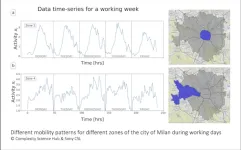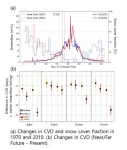(Press-News.org) The new results will help to follow patients with a bad prognosis more closely, and to move towards more personalized treatments.
Mercedes Robledo, co-lead author, has been studying pheochromocytomas since 1996 and leads the CNIO group that has identified 5 of the 22 genes associated with these rare tumors.
The research analyzes an "exceptionally high" number of samples, something very difficult in rare diseases and achieved thanks to the collaboration of centers from countries all over the world.
Pheochromocytoma is a rare tumor, with an incidence of three to eight cases per million population per year. The work published today, the Rare Disease Day 2023, is the largest study on this cancers’ molecular causes and focuses on patients with metastatic pheochromocytomas, which account for 20% of all cases. Survival of patients with metastatic pheochromocytoma is 20-60% at five years.
Mercedes Robledo, head of the Hereditary Endocrine Cancer Group at the Spanish National Cancer Research Center (CNIO) and one of the two researchers who led the study, has been studying these tumors since 1996: "One of the difficulties of working with rare diseases is to recruit large series of patients to reach robust conclusions. And this study stands out because the number of samples we worked with was outstanding". The CNIO's belongs to Spanish network of Rare Diseases (CIBERER).
To understand the magnitude of the study, CNIO researcher and co-author Bruna Calsina explains, "The number of patients with metastatic disease that our study gathers corresponds to a population of one hundred million people." This has been possible thanks to the collaboration between 16 centers from six countries around the world, with which the CNIO has been collaborating for the last decade.
Such a large sample was necessary to achieve what they, and their research colleagues, have achieved with their work: to identify, at the time of diagnosis of the primary tumor, markers associated with an increased risk of metastasis. These markers can be added to other clinical and histological criteria for personalized clinical management.
As Robledo and Calsina explain, most patients with this type of tumor who develop metastasis do so one or two years after the diagnosis of the disease, but there are cases in which metastasis develops ten or twenty years after the initial diagnosis. The new molecular markers will help clinicians to follow more closely those patients at high risk of metastasis.
Patients who might respond to immunotherapy
Another problem with this rare disease is that the therapies do not always work, and the reason is unknown. "This is a hereditary disease in 40%-50% of cases," explains Mercedes Robledo, "and very complex from a genetic point of view. Up to twenty-two genes related to the disease have been identified, of which five have been discovered in our laboratory."
The more genes involved in a disease, the more difficult it is to study and the more complex it is to find effective therapies. To date, several types of treatment have been tested, from chemotherapy to targeted therapies, but as Bruna Calsina explains, "It is not known a priori which patients might respond to one therapy or another".
For this reason, another part of the research consisted of searching for markers that would allow treatment to be personalized. The research led by Robledo and Calsina has identified a group of patients with pheochromocytoma who could benefit from immunotherapy treatments.
This work would not have been possible without the close collaboration between the CNIO Hereditary Endocrine Cancer Group and the CNIO Bioinformatics Unit, together with other CNIO researchers and international collaborators. "The study will be a benchmark in the field of metastatic pheochromocytoma," concludes Robledo.
END
The largest genomic study of rare cancer metastathic pheochromocytoma identifies patients at highest risk of metastasis and those who would respond to immunotherapy
Feb 28 is Rare Disease Day 2023
2023-02-28
ELSE PRESS RELEASES FROM THIS DATE:
How to predict city traffic
2023-02-28
A new machine learning model can predict traffic activity in different zones of cities. To do so, a Complexity Science Hub researcher used data from a main car-sharing company in Italy as a proxy for overall city traffic. Understanding how different urban zones interact can help avoid traffic jams, for example, and enable targeted responses of policy makers - such as local expansion of public transportation.
Understanding people's mobility patterns will be central to improving urban traffic flow. “As populations grow in urban areas, this knowledge can help policymakers design and implement effective transportation ...
Parental support for LGBTQ youth is important, research shows
2023-02-28
Depression is more widespread among lesbian, gay, bisexual, transgender, or questioning (LGBTQ) youth than heterosexual, cisgender youth, making parental support more important for these adolescents. A new study released in Child Development by researchers at The University of Texas at Austin looks at parental social support and psychological control in relation to depressive symptoms for LGBTQ youth in the United States. Psychological control attempts to intrude into the psychological and emotional development of the child (e.g., thinking processes, self-expression, emotions, and attachment to parents). Although ...
SUTD to launch south-east Asia’s first O-RAN Open Testing and Integration Centre (OTIC)
2023-02-28
SUTD to Launch South-east Asia’s First O-RAN Open Testing and Integration Centre (OTIC)
Announced at the Mobile World Congress Barcelona (MWC) 2023, Singapore University of Technology and Design (SUTD) will launch a new O-RAN[1] Asia & Pacific Open Testing and Integration Centre (OTIC) in Singapore. As part of Singapore’s S$70 million Future Communications R&D Programme (FCP) supported by Singapore’s Infocomm Media Development Authority (IMDA) and the National Research Foundation, Singapore (NRF), the Asia & Pacific OTIC in Singapore ...
12 exotic bacteria found to passively collect rare earth elements from wastewater
2023-02-28
Rare earth elements (REEs) are a group of 17 chemically similar metals, which got their name because they typically occur at low concentrations (between 0.5 and 67 parts per million) within the Earth’s crust. Because they are indispensable in modern technology such as light emitting diodes, mobile phones, electromotors, wind turbines, hard disks, cameras, magnets, and low-energy lightbulbs, the demand for them has increased steadily over the past few decades, and is predicted to rise further by 2030.
As ...
Will future computers run on human brain cells?
2023-02-28
A “biocomputer” powered by human brain cells could be developed within our lifetime, according to Johns Hopkins University researchers who expect such technology to exponentially expand the capabilities of modern computing and create novel fields of study.
The team outlines their plan for “organoid intelligence” today in the journal Frontiers in Science.
“Computing and artificial intelligence have been driving the technology revolution but they are reaching a ceiling,” said Thomas Hartung, a professor of environmental health sciences at ...
Study reveals improvements in workplace support and leadership training will improve the mental health and potentially reduce burnout in healthcare professionals
2023-02-28
Amongst healthcare professionals, the feeling of being supported in the workplace can protect them against adverse mental health and burnout, according to a new study published in CMAJ Open by researchers at Queen Mary University of London and medical staff at various hospitals across the UK.
CoPE-HCP study was designed, during the early part of COVID-19 pandemic, when there was great concern for the mental health of healthcare professionals with no scientifically-proven mitigating strategies to reduce that impact. Funded by Barts Charity, this new longitudinal study found that feeling unsupported ...
Immune system drug shows promise in treating alcohol use disorder, a Scripps Research clinical trial reports
2023-02-28
LA JOLLA, CA—A clinical trial carried out at Scripps Research has shown that apremilast, approved by the U.S. Food and Drug Administration (FDA) for the treatment of psoriasis, cuts alcohol intake by more than half in people with severe alcohol use disorder (AUD). Collaborators at Oregon Health and Science University (OHSU) and other institutions also showed that, in mice, apremilast boosts activity in an area of the brain known to be involved in AUD.
The research was published online ahead of ...
$10 million grant funds Scripps Research Alcohol Research Center through its 50th year
2023-02-28
LA JOLLA, CA—The National Institute on Alcohol Abuse and Alcoholism (NIAAA) has awarded scientists at Scripps Research a $10 million grant to study the cellular and molecular changes in the brain that underlie alcohol use disorder (AUD). The grant will fund the Scripps Research Alcohol Research Center (TSRI-ARC) for five years, carrying the research into its 50th year of consecutive NIAAA funding—first beginning in 1977.
“A lot of exciting things have happened in the AUD field over the last 45 years, and the center has been at the forefront of many of them,” ...
First study to show childhood obesity is linked to increased risk of four of the five newly proposed subtypes of adult-onset diabetes
2023-02-28
New research published in Diabetologia (the journal of the European Association for the Study of Diabetes [EASD]) is the first study to show that childhood obesity is associated with an increased risk of four of the five recently proposed subtypes of adult-onset diabetes. The study is by Yuxia Wei, Institute of Environmental Medicine, Karolinska Institutet, Stockholm, Sweden, and colleagues.
In 2018, a ground-breaking study identified five novel subtypes of adult-onset diabetes: severe autoimmune diabetes (SAID, including type 1 diabetes and latent autoimmune diabetes in adults [LADA]) and four ...
Pakistan streamflow timing will become three times faster by end of century
2023-02-28
Nature has remained in balance for a long time, but climate change due to modern human activities is disrupting the balance of the natural system. The disruption makes it more difficult for humans – who must work with nature to survive – to predict the future. Moreover, developing countries with limited understanding and preparation for climate change are more vulnerable to climate change-driven social and economic damage. Recently, a research team from POSTECH corrected the biases of future regional climate model projection data to ...
LAST 30 PRESS RELEASES:
Korea University, Stanford University, and IESGA launch Water Sustainability Index to combat ESG greenwashing
Molecular glue discovery: large scale instead of lucky strike
Insulin resistance predictor highlights cancer connection
Explaining next-generation solar cells
Slippery ions create a smoother path to blue energy
Magnetic resonance imaging opens the door to better treatments for underdiagnosed atypical Parkinsonisms
National poll finds gaps in community preparedness for teen cardiac emergencies
One strategy to block both drug-resistant bacteria and influenza: new broad-spectrum infection prevention approach validated
Survey: 3 in 4 skip physical therapy homework, stunting progress
College students who spend hours on social media are more likely to be lonely – national US study
Evidence behind intermittent fasting for weight loss fails to match hype
How AI tools like DeepSeek are transforming emotional and mental health care of Chinese youth
Study finds link between sugary drinks and anxiety in young people
Scientists show how to predict world’s deadly scorpion hotspots
ASU researchers to lead AAAS panel on water insecurity in the United States
ASU professor Anne Stone to present at AAAS Conference in Phoenix on ancient origins of modern disease
Proposals for exploring viruses and skin as the next experimental quantum frontiers share US$30,000 science award
ASU researchers showcase scalable tech solutions for older adults living alone with cognitive decline at AAAS 2026
Scientists identify smooth regional trends in fruit fly survival strategies
Antipathy toward snakes? Your parents likely talked you into that at an early age
Sylvester Cancer Tip Sheet for Feb. 2026
Online exposure to medical misinformation concentrated among older adults
Telehealth improves access to genetic services for adult survivors of childhood cancers
Outdated mortality benchmarks risk missing early signs of famine and delay recognizing mass starvation
Newly discovered bacterium converts carbon dioxide into chemicals using electricity
Flipping and reversing mini-proteins could improve disease treatment
Scientists reveal major hidden source of atmospheric nitrogen pollution in fragile lake basin
Biochar emerges as a powerful tool for soil carbon neutrality and climate mitigation
Tiny cell messengers show big promise for safer protein and gene delivery
AMS releases statement regarding the decision to rescind EPA’s 2009 Endangerment Finding
[Press-News.org] The largest genomic study of rare cancer metastathic pheochromocytoma identifies patients at highest risk of metastasis and those who would respond to immunotherapyFeb 28 is Rare Disease Day 2023





